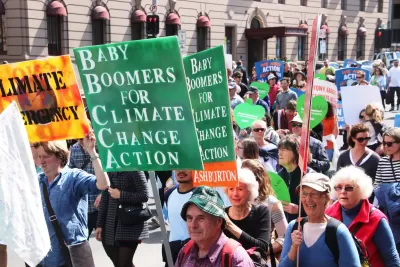Despite appearances and a popular media narrative, Baby Boomers aren't becoming more urban in old age—when compared to previous generations at the same age.

The narrative about Baby Boomers moving back to the city alongside Millennials is wrong, according to an article by Jed Kolko: "Boomers today are actually less urban than previous generations of older people."
If it seems like more baby Boomers are living in the urban cores of metropolitan areas these days, it has more to do with the size of the generation, not the share of the generation.
"In 2018, 17.8 percent of people aged 54 to 72 lived in urban neighborhoods, defined based on neighborhood density," according to Kolko. "That’s down from 18.2 percent for that age group in 2010, 19.9 percent in 2000, and 21.6 percent in 1990."
Kolko has a few other surprises to share, like the declining share of Generation X (declined by 2 percent compared to the same age group living in 2000) and Millennials (declined by 4 percent).
"Moreover, while there has been a notable increase in urban living among higher-income young adults, rich older people are less likely to live in urban neighborhoods in 2018 than their counterparts in 2000, even with a very slight increase since 2012," according to Kolko.
While Baby Boomers aren't flocking back to cities, they are more likely to rent and more likely to live in multi-family developments—urban lifestyles in suburban settings.
FULL STORY: The Myth of the Urban Boomer

Alabama: Trump Terminates Settlements for Black Communities Harmed By Raw Sewage
Trump deemed the landmark civil rights agreement “illegal DEI and environmental justice policy.”

Study: Maui’s Plan to Convert Vacation Rentals to Long-Term Housing Could Cause Nearly $1 Billion Economic Loss
The plan would reduce visitor accommodation by 25% resulting in 1,900 jobs lost.

Planetizen Federal Action Tracker
A weekly monitor of how Trump’s orders and actions are impacting planners and planning in America.

Wind Energy on the Rise Despite Federal Policy Reversal
The Trump administration is revoking federal support for renewable energy, but demand for new projects continues unabated.

Passengers Flock to Caltrain After Electrification
The new electric trains are running faster and more reliably, leading to strong ridership growth on the Bay Area rail system.

Texas Churches Rally Behind ‘Yes in God’s Back Yard’ Legislation
Religious leaders want the state to reduce zoning regulations to streamline leasing church-owned land to housing developers.
Urban Design for Planners 1: Software Tools
This six-course series explores essential urban design concepts using open source software and equips planners with the tools they need to participate fully in the urban design process.
Planning for Universal Design
Learn the tools for implementing Universal Design in planning regulations.
Caltrans
Smith Gee Studio
Institute for Housing and Urban Development Studies (IHS)
City of Grandview
Harvard GSD Executive Education
Toledo-Lucas County Plan Commissions
Salt Lake City
NYU Wagner Graduate School of Public Service





























